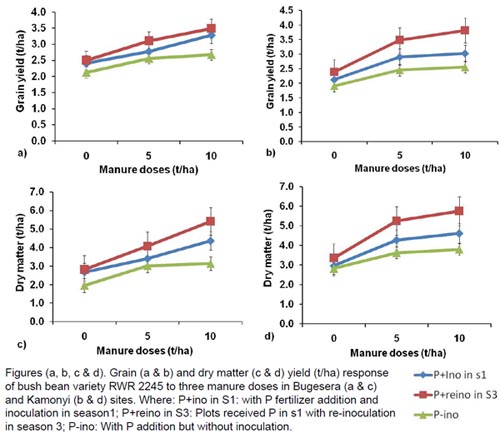In Rwanda like in many sub-Saharan Africa countries, increasing population hence reduction of farm size, declining soil fertility and high fertilizer cost have been reported as major production constraints for smallholder farmers. The use of organic inputs and biological nitrogen fixation are alternative to cut down fertilizer costs. Rwandan government has recently set a policy of one cow per poor family in one hand to deal with soil fertility issues. In this study we explored the benefits of using manure and inoculation for increased nitrogen fixation and yields of bean and soyabean, and manure showed the ability to sustain productivity without repeated inoculation.
|
Among the activities done under the present PhD research, here we present some results on the last field experiment on the need- to- reinoculate in previously inoculated fields showing how grain and dry matter of bush bean responded to manure and inoculation at two different sites in Rwanda.The variety of bush bean used responded to inoculation when manure was added. Re-inoculation effect was more significant in Kamonyi site than Bugesera site. Low grain and dry matter yields were observed in uninoculated plots with no manure application at each site and season but consistently higher in Kamonyi than Bugesera. However, an increase in grain yield in uninoculated plots was observed with manure addition. Higher grain and dry matter yields were observed in inoculated and manured plots. The Bugesera site suggest the use of more manure rates compared to Kamonyi site which showed a peak at 5t/ha for both inoculated and uninoculated plots. There was no significant differences between re- inoculated plots and inoculated plots in the first season receiving 5t and 10t/ha for both grain and dry matter yields in Bugesera site (figures a & c). The high yields observed in manured treatments without inoculation shows the benefits of manure to plant growth in the case of lack of inoculants to farmers. |
|
Currently, I am back in Wageningen for laboratory work on one component of my research on rhizobia identification and thesis write up.
Edouard Rurangwa, Wageningen University, The Netherlands


